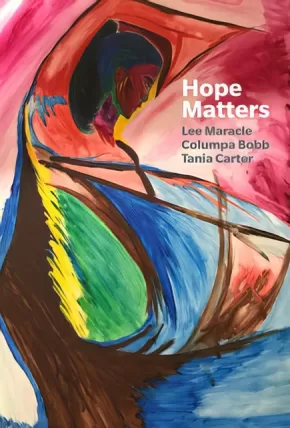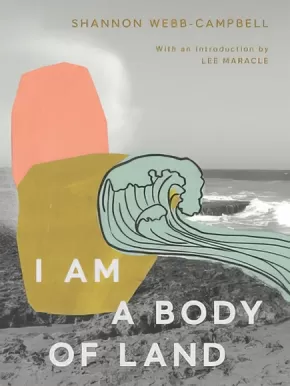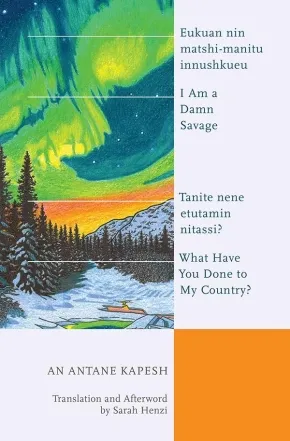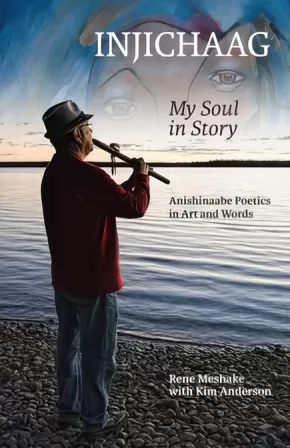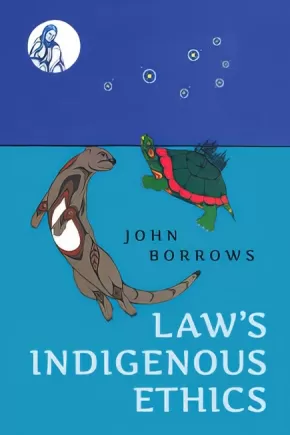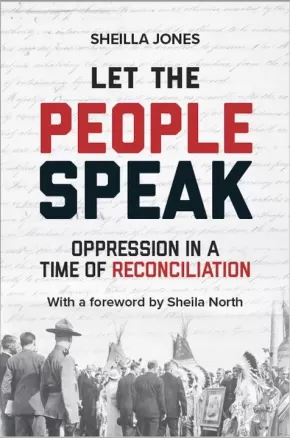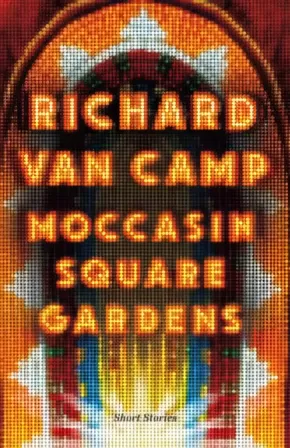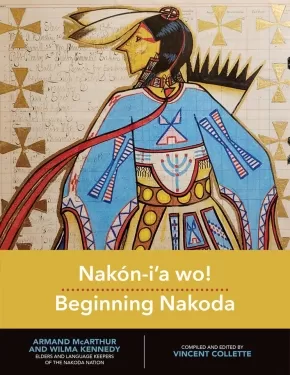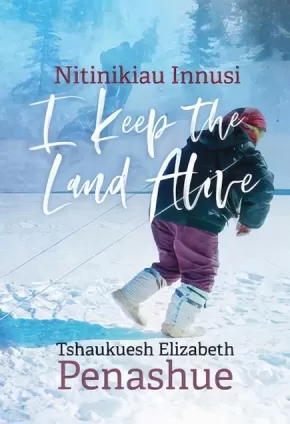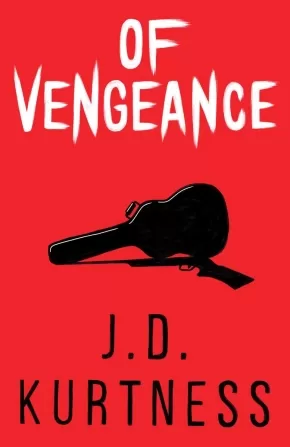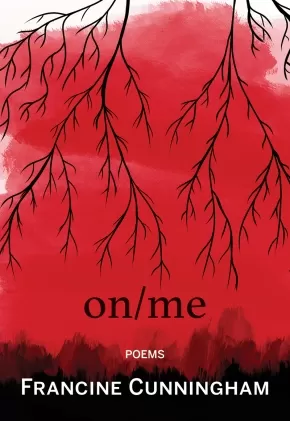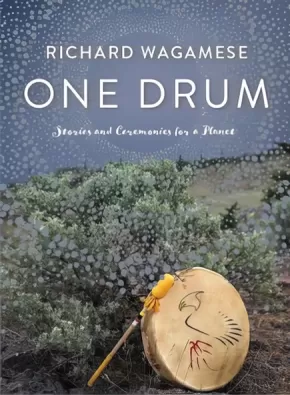First Nations
Synopsis:
Hope Matters, written by multiple award-winner Lee Maracle, in collaboration with her daughters Columpa Bobb and Tania Carter, focuses on the journey of Indigenous people from colonial beginnings to reconciliation.
Maracle states that the book, "is also about the journey of myself and my two daughters." During their youth, Bobb and Carter wrote poetry with their mother, and eventually they all decided that one day they would write a book together. This book is the result of that dream. Written collaboratively by all three women, the poems in Hope Matters blend their voices together into a shared song of hope and reconciliation.
Educator Information
Recommended in the Canadian Indigenous Books for Schools 2019-2020 resource list as being useful for grades 10 to 12 in the areas of Creative Writing, English Language Arts, Media Studies, and Social Studies.
This poetry contains some mature language/subject matter.
Additional Information
104 pages | 5.25" x 8.00"
Synopsis:
I Am a Body of Land by Shannon Webb-Campbell explores poetic responsibility and accountability, and frames poetry as a form of revisioning. In these poems, Webb-Campbell returns to her own text Who Took My Sister?, to examine her self and to decolonize, unlearn, and undo harm. By reconsidering individual poems and letters, Webb-Campbell's confessional writing circles back upon itself to ask questions of her own settler-Indigenous identity and belonging to cry out for community, and call in with love.
With an introduction by multiple award-winning writer and activist Lee Maracle.
Reviews
“Shannon Webb-Campbell’s work forces readers out of polite conversation and into a realm where despair and hard truths are being told, being heard and finding the emotional strength to learn from it, find our way out and embrace our beauty as Indigenous women.”—Carol Rose Daniels, author of Hiraeth and Bearskin Diary, winner of the First Nations Communities READ Award and the Aboriginal Literature Award.
“Poetry awake with the winds from the Four Directions, poetry that crosses borders, margins, treaties, yellow tape warning: Police Line. Do Not Cross. Poetry whose traditional territory, through colonization, has become trauma and shame. Unceded poetry. Read. Respect. Weep.”—Susan Musgrave, author of Origami Dove
Educator Information
Recommended in the Canadian Indigenous Books for Schools 2019-2020 resource list as being useful for grades 10 to 12 in the areas of Media Studies, Social Studies, and English Language Arts.
Additional Information
74 pages | 5.25" x 8.00"
Synopsis:
Quebec author An Antane Kapesh's two books, Je suis une maudite sauvagesse (1976) and Qu'as-tu fait de mon pays? (1979), are among the foregrounding works by Indigenous women in Canada. This English translation of these works, presented alongside the revised Innu text, makes them available for the first time to a broader readership.
In I Am a Damn Savage, Antane Kapesh wrote to preserve and share her culture, experience, and knowledge, all of which, she felt, were disappearing at an alarming rate because many Elders – like herself – were aged or dying. She wanted to publicly denounce the conditions in which she and the Innu were made to live, and to address the changes she was witnessing due to land dispossession and loss of hunting territory, police brutality, and the effects of the residential school system. What Have You Done to My Country? is a fictional account by a young boy of the arrival of les Polichinelles and their subsequent assault on the land and on native language and culture.
Through these stories Antane Kapesh asserts that settler society will eventually have to take responsibility and recognize its faults, and accept that the Innu – as well as all the other nations – are not going anywhere, that they are not a problem settlers can make disappear.
Additional Information
216 pages | 5.25" x 8.00" | Translation and Afterword by Sarah Henzi
Synopsis:
Dementia is on the rise around the world, and health organizations in Canada, the United States, and New Zealand are responding to the urgent need – voiced by communities and practitioners – for guidance on how best to address memory loss in Indigenous communities. This innovative volume responds to the call by bringing together, for the first time, research studies and Indigenous teaching stories on this topic. Using decolonizing methods, it addresses key areas of concern with chapters that:
- examine the prevalence and causes of dementia, as well as the public discourse surrounding the issue
- provide examples for incorporating Indigenous perspectives on care and prevention into research and practice
- demonstrate culturally safe applications of research to Elder care.
Presenting strategies for health practice and effective collaborative research informed by Indigenous knowledge and worldviews, this book is a valuable resource for researchers, practitioners, students, and educators who seek a better understanding of memory loss and memory care.
This book will be of interest to students, educators, researchers, and practitioners working in or interested in the fields of dementia studies and Indigenous health.
Reviews
"This book represents the first significant contribution to what we know about how Indigenous peoples understand dementia and memory loss." - from the foreword by Rod McCormick (Kanienkehaka), professor and British Columbia Innovation Council research chair in Aboriginal Health, Faculty of Education and Social Work, Thompson Rivers University
"A leap forward in understanding how health care can be provided in culturally safe ways." - Lloy Wylie, assistant professor, Schulich School of Medicine and Dentistry, Western University
Educator Information
Table of Contents
Foreword / Rod McCormick
Introduction / Wendy Hulko, Jean E. Balestrery, and Danielle Wilson
We Call It Healing / Secwepemc Elder, Wendy Hulko, Danielle Wilson, Star Mahara, Gwen Campbell-McArthur, Jean William, Cecilia DeRose, and Estella Patrick Moller
Part 1: Prevalence, Causes, and Public Discourse
1 Current and Projected Dementia Prevalence in First Nations Populations in Canada / Jennifer Walker and Kristen Jacklin
2 Indigenous Vascular Dementia: An Indigenous Syndemic Dementia Model / J. Neil Henderson, Linda D. Carson, and Kama King
3 A Story about Joe in the News Media: Decolonizing Dementia Discourse / Suzanne MacLeod
Coyote: Keeper of Memories / Danielle Wilson, Gwen Campbell-McArthur, Wendy Hulko, Star Mahara, Jean William, Cecilia DeRose, and Estella Patrick Moller
Part 2: Indigenous Perspectives on Care and Prevention
4 Perceptions of Dementia Prevention among Anishinaabe Living on Manitoulin Island / Jessica E. Pace, Kristen Jacklin, Wayne Warry, and Karen Pitawanakwat
5 The Understanding from Within Project: Perspectives from Indigenous Caregivers / Carrie Bourassa, Melissa Blind, Kristen Jacklin, Eric Oleson, and Kate Ross-Hopley
6 Oldest Age Does Not Come Alone: “What’s the Name of the Day?” / Mere Kēpa
A Fecund Frontier: We Listen ... in between Talk ... We Listen / Jean E. Balestrery and Sophie “Eqeelana Tungwenuk” Nothstine
Part 3: Applying Theory and Knowledge to Practice
7 Depression, Diabetes, and Dementia: Historical, Biocultural, and Generational Factors among American Indian and Alaska Native Elders / Linda D. Carson, J. Neil Henderson, and Kama King
8 Adapting CIRCA-BC in the Post-Residential-School Era / Barbara Purves and Wendy Hulko
9 Focus(ing) on Love and Respect: Translating Elders’ Teachings on Aging and Memory Loss into Learning Tools for Children and Youth / Wendy Hulko, Danielle Wilson, and Jessica Kent
Conclusion / Wendy Hulko, Jean E. Balestrery, and Danielle Wilson
Index
Additional Information
264 pages | 6.00" x 9.00"
Synopsis:
Indigenous Relations: Your Guide to Working Effectively with First Nations, Métis, and Inuit.
A timely sequel to the bestselling 21 Things You May Not Know About the Indian Act - and an invaluable guide for anyone seeking to work more effectively with Indigenous Peoples.
We are all treaty people. But what are the everyday impacts of treaties, and how can we effectively work toward reconciliation if we're worried our words and actions will unintentionally cause harm?
Hereditary chief and leading Indigenous relations trainer Bob Joseph is your guide to respecting cultural differences and improving your personal relationships and business interactions with Indigenous Peoples. Practical and inclusive, Indigenous Relations interprets the difference between hereditary and elected leadership, and why it matters; explains the intricacies of Aboriginal Rights and Title, and the treaty process; and demonstrates the lasting impact of the Indian Act, including the barriers that Indigenous communities face and the truth behind common myths and stereotypes perpetuated since Confederation.
Indigenous Relations equips you with the necessary knowledge to respectfully avoid missteps in your work and daily life, and offers an eight-part process to help business and government work more effectively with Indigenous Peoples - benefitting workplace culture as well as the bottom line. Indigenous Relations is an invaluable tool for anyone who wants to improve their cultural competency and undo the legacy of the Indian Act.
Educator Information
Recommended in the Canadian Indigenous Books for Schools 2020/2021 resource list for grades 11 and 12 in these areas: Social Studies, Law, English Language Arts, and Social Justice.
Additional Information
200 pages | 8.00" x 5.00"
Synopsis:
This book shares the life story of Anishinaabe artist Rene Meshake in stories, poetry, and Anishinaabemowin “word bundles” that serve as a dictionary of Ojibwe poetics. Meshake was born in the railway town of Nakina in northwestern Ontario in 1948, and spent his early years living off-reserve with his grandmother in a matriarchal land-based community he calls Pagwashing. He was raised through his grandmother’s “bush university,” periodically attending Indian day school, but at the age of ten Rene was scooped into the Indian residential school system, where he suffered sexual abuse as well as the loss of language and connection to family and community. This residential school experience was lifechanging, as it suffocated his artistic expression and resulted in decades of struggle and healing. Now in his twenty-eighth year of sobriety, Rene is a successful multidisciplinary artist, musician and writer. Meshake’s artistic vision and poetic lens provide a unique telling of a story of colonization and recovery.
The material is organized thematically around a series of Meshake’s paintings. It is framed by Kim Anderson, Rene’s Odaanisan (adopted daughter), a scholar of oral history who has worked with Meshake for two decades. Full of teachings that give a glimpse of traditional Anishinaabek lifeways and worldviews, Injichaag: My Soul in Story is “more than a memoir.”
Awards
- 2020 Indigenous Voices Awards Winner for Works in an Indigenous Language
Reviews
“This is the story of an Anishinaabe journey across time and space. This is more than an autobiography of trauma, it is a celebration of resilience.”– Margaret Noodin, Associate Professor, English and American Indian Studies, University of Wisconsin-Milwaukee
Educator Information
Table of Contents
Invocation
Family Tree
Community Tree
Introduction
Section 1 Odinimanganikadjigan
Section 2 Nibinaabe
Section 3 Wikwedong
Section 4 Bimisi
Section 5 Miskwadesshimo
Section 6 Papawangani
Section 7 Migisiwiganj
Epilogue
Additional Information
240 pages | 5.50" x 8.50"
Synopsis:
TIME: All.
SPACE: The Multiverse.
Come along for the ride to Kamloopa, the largest Powwow on the West Coast. This high-energy Indigenous matriarchal story follows two urban Indigenous sisters and a lawless Trickster who face our postcolonial world head-on as they come to terms with what it means to honour who they are and where they come from. But how to go about discovering yourself when Christopher Columbus allegedly already did that? Bear witness to the courage of these women as they turn to their Ancestors for help in reclaiming their power in this ultimate transformation story.
In developing matriarchal relationships and shared Indigenous values, Kamloopa explores the fearless love and passion of two Indigenous women reconnecting with their homelands, Ancestors, and stories. Kim Senklip Harvey’s play is a boundary-blurring adventure that will remind you to always dance like the Ancestors are watching.
Kamloopa: An Indigenous Matriarch Story is the work of Kim Senklip Harvey, a proud Indigenous woman from the Syilx, Tsilhqot’in, Ktunaxa, and Dakelh First Nations, listed for the Gina Wilkinson Prize for her work as an emerging director and widely considered to be one of this land’s most original voices among the next generation of Indigenous artists.
Awards
- 2020 Governor General's Award for English-language drama
Reviews
"A thoughtful, funny, and compelling exploration of the complexities of Indigenous community making and knowledge reclamation."—BC Studies
“Kamloopa is a hilarious and courageous transformation story. Kim Senklip Harvey makes a generous invitation for all of us to bear witness to the joy, resilience, and brilliance of Indigenous women.”—Christine Quintana
“This story about three women who are actively trying to decolonize themselves (whether they realize it or not) resonated deeply … Uplifting the voices of Indigenous women, Two-Spirit, and non-binary folks is incredibly important to our resistance and our communities. Kamloopa is one of those stories providing that platform.”—Yolanda Bonnell
“Kamloopa brought me an empowerment of self and a reclaiming of knowledge. It brought me sisterhood and ties that have shaped the way I create and approach life. As an Indigenous woman I felt seen, heard, and valid, something we should all experience. Miigwech.”—Samantha Brown
Educator Information
Recommended in the Canadian Indigenous Books for Schools 2020/2021 resource list for grades 8 to 12 for Acting, Drama, Theatre, and English Language Arts.
The Syilx language, Nsyilxcǝn, is used throughout this play. Also included is the resource "Fire Zine! A Kamloopa Study Buddy" by Kimi Clark. It discusses Indigenous artistic ceremony Protocol, Indigenous Theatre terms, and guides users in facilitating a Talking Circle.
Additional Information
|
Synopsis:
Law’s Indigenous Ethics examines the revitalization of Indigenous peoples’ relationship to their own laws and, in so doing, attempts to enrich Canadian constitutional law more generally. Organized around the seven Anishinaabe grandmother and grandfather teachings of love, truth, bravery, humility, wisdom, honesty, and respect, this book explores ethics in relation to Aboriginal issues including title, treaties, legal education, and residential schools.
With characteristic depth and sensitivity, John Borrows brings insights drawn from philosophy, law, and political science to bear on some of the most pressing issues that arise in contemplating the interaction between Canadian state law and Indigenous legal traditions. In the course of a wide-ranging but accessible inquiry, he discusses such topics as Indigenous agency, self-determination, legal pluralism, and power. In its use of Anishinaabe stories and methodologies drawn from the emerging field of Indigenous studies, Law’s Indigenous Ethics makes a significant contribution to scholarly debate and is an essential resource for readers seeking a deeper understanding of Indigenous rights, societies, and cultures.
Reviews
"Law’s Indigenous Ethics addresses very controversial topics in Canada, not just in Indigenous legal studies, but far beyond that. John Borrows employs story work methodology, along with thorough legal research, ensuring that his work is truly leading edge. Law’s Indigenous Ethics will further advance Indigenous studies in Canada and beyond. Borrows’s work moves beyond the binary, divisive, and linear ideologies dominating the Indigenous intellectual landscape in Canada. He provides nuance, complicates dominate narratives, and gives the reader much food for thought and, more importantly, asks the reader to think, reflect, and embrace the principles embedded in the seven grandmother and grandfather teachings as a whole." -Deborah McGregor, Osgoode Hall Law School, Canada Research Chair in Indigenous Environmental Justice, York University
"Law’s Indigenous Ethics is extremely novel, important, and has the potential for great influence. Demonstrating tremendous expertise and fluency with its subjects, John Borrows’s arguments are sound and thoughtful, providing a number of important insights that lead me to adjust the way I think about issues that are very familiar to me." -Bethany Berger, Wallace Stevens Professor of Law, University of Connecticut
Additional Information
400 pages | 6.00" x 9.00"
Synopsis:
Over the past fifty years, Canada's Indigenous Affairs department (now two departments with more than 30 federal co-delivery partners) has mushroomed into a "super-province" delivering birth-to-death programs and services to First Nations, Inuit and Métis people. This vast entity has jurisdictional reach over 90-percent of Canada's landscape, and an annual budget of some $20-billion. Yet Indigenous people have no means to hold this "super-province" accountable to them. Not a single person in this entity has been elected by Indigenous people to represent their interests. Not one. When it comes to federal Indigenous policy, ordinary Indigenous people in Canada are voiceless and powerless.
In Let the People Speak: Oppression in a Time of Reconciliation, author and journalist Sheilla Jones raises an important question: are the well-documented social inequities in Indigenous communities--high levels of poverty, suicide, incarceration, children in care, family violence--the symptoms of this long-standing, institutionalized powerlessness? If so, the solution lies in empowerment. And the means of empowerment is already embedded in the historic treaties. Jones argues that there can be meaningful reconciliation only when ordinary Indigenous Canadians are finally empowered to make their voices heard, and ordinary non-Indigenous Canadians can join with them to advance a shared future.
Educator Information
Includes a foreword from Sheila North. Sheila is from the Bunibonibee Cree Nation and is the former Grand Chief of the Manitoba Keewatinowi Okimakanak (MKO), and former Chief Communications Officer for the Assembly of Manitoba Chiefs. She is a former Gemini-nominated CBC journalist, former CTV journalist and documentarist.
Additional Information
256 pages | 6.00" x 9.00"
Synopsis:
Master Tłı̨chǫ storyteller and bestselling author Richard Van Camp captures the shifting and magical nature of the North in this stunning collection of short stories.
The characters of Moccasin Square Gardens inhabit Denendeh, the land of the people north of the sixtieth parallel. These stories are filled with in-laws, outlaws and common-laws. Get ready for illegal wrestling moves (“The Camel Clutch”), pinky promises, a doctored casino, extraterrestrials or “Sky People,” love, lust, and prayers for peace.
While this is Van Camp’s most hilarious short story collection, it’s also haunted by the lurking presence of the Wheetago, human-devouring monsters of legend that have returned due to global warming and the greed of humanity. The stories in Moccasin Square Gardens show that medicine power always comes with a price.
To counteract this darkness, Van Camp weaves a funny and loving portrayal of the Tłı̨chǫ Dene and other communities of the North, drawing from oral history techniques to perfectly capture the character and texture of everyday small-town life. “Moccasin Square Gardens” is the nickname of a dance hall in the town of Fort Smith that serves as a meeting place for a small but diverse community. In the same way, the collection functions as a meeting place for an assortment of characters, from shamans and time-travelling goddess warriors to pop-culture-obsessed pencil pushers, to con artists, archivists and men who just need to grow up, all seeking some form of connection.
Educator Information
Recommended in the Canadian Indigenous Books for Schools 2019-2020 resource list as being useful for grades 11 and 12 for these subjects: English Language Arts, Media Studies, Social Studies.
Includes mature language, sexual references, gory violence, and content related to sexual abuse and trauma.
Additional Information
160 pages | 5.50" x 8.50"
Synopsis:
Nakón-i'a wo! Beginning Nakoda is a language resource designed to help revitalize and document Nakoda, now spoken in Manitoba and Saskatchewan.
Written for beginning learners of Nakoda (also known as Assiniboine), this workbook, arranged thematically, provides a Nakoda/English lexicon, a vocabulary, a table of kinship terms, a glossary of linguistic terminology, and exercises to do after each lesson.
This book was made possible with the assistance of Elders and Language Keepers of the Nakoda Nation: Armand McArthur and Wilma Kennedy, Main Consultants; with additional contributions by Pete Bigstone, Leona Kroscamp, Freda O'Watch, and Ken Armstrong.
Educator & Series Information
Recommended for Grades 7+
Part of the Indigenous Languages for Beginners series.
Additional Information
304 pages | 8.50" x 11.00" | Black and white illustrations throughout
Synopsis:
Labrador Innu cultural and environmental activist Tshaukuesh Elizabeth Penashue is well-known both within and far beyond the Innu Nation. The recipient of a National Aboriginal Achievement Award and an honorary doctorate from Memorial University, she has been a subject of documentary films, books, and numerous articles. She led the Innu campaign against NATO’s low-level flying and bomb testing on Innu land during the 1980s and ’90s, and was a key respondent in a landmark legal case in which the judge held that the Innu had the “colour of right” to occupy the Canadian Forces base in Goose Bay, Labrador. Over the past twenty years she has led walks and canoe trips in nutshimit, “on the land,” to teach people about Innu culture and knowledge.
Nitinikiau Innusi: I Keep the Land Alive began as a diary written in Innu-aimun, in which Tshaukuesh recorded day-to-day experiences, court appearances, and interviews with reporters. Tshaukuesh has always had a strong sense of the importance of documenting what was happening to the Innu and their land. She also found keeping a diary therapeutic, and her writing evolved from brief notes into a detailed account of her own life and reflections on Innu land, culture, politics, and history.
Beautifully illustrated, this work contains numerous images by professional photographers and journalists as well as archival photographs and others from Tshaukuesh’s own collection.
Additional Information
288 pages | 6.00" x 8.50" | 128 colour illustrations | 1 map | bibliography
Synopsis:
“Let's be honest: Who hasn't fantasized about shooting someone in the face with a hunting rifle?”
One day, a thirteen-year-old girl decides to startle a classmate. Instead, she accidentally kills him.
And she likes it.
Over the years, she begins experimenting with murder. Her victims are, of course, people that deserve it: a careless driver, a CEO of an energy corporation that is destroying the planet, a rapist. Every crime scene is flawless — untraceable and made to look like an accident or suicide. But, as she sleepwalks through her day job and lives in a crummy apartment, one thing becomes increasingly clear: she needs more.
Because nothing compares to the thrill of violent retribution.
Awards
- The French version of this book won the Indigenous Voices Award for French Prose in 2018.
Reviews
"Kurtness writes smoothly … Readers into passive-aggressive fantasies will best appreciate this one."— Publishers Weekly
"This chiseled writing, this extraordinary character and this particular humour may seduce the most difficult reader." — Le Devoir
"A softly creepy look into a sociopath starting with her thoughts as a 12-year-old. Narrated in a non-linear fashion, she starts with an incident from her past and her philosophy of who deserves to be punished. She’s out for revenge on wrongdoers who bully or disrupt the environment. She grew up with loving parents and a nice home but this is how she is wired. I’m not sure how I feel about the ending but I can see how she evolved to commit that last act." — Audrey Huang, Belmont Books
Educator Information
Translated by Pablo Strauss, who has translated many works of Quebec fiction into English. He grew up in Victoria, B.C., and has lived in Quebec City for fifteen years.
Additional Information
160 pages | 5.00" x 7.00" | Paperback
Synopsis:
Francine Cunningham lives with constant reminders that she doesn't fit the desired expectations of the world: she is a white-passing, city-raised Indigenous woman with mental illness who has lost her mother. In her debut poetry collection ON/ME, Cunningham explores, with keen attention and poise, what it means to be forced to exist within the margins. Cunningham does not hold back: she holds a lens to residential schools, intergenerational trauma, Indigenous Peoples forcibly sent to sanatoriums, systemic racism and mental illness, and translates these topics into lived experiences that are nuanced, emotional, funny and heartbreaking all at once. ON/ME is an encyclopedia of Cunningham, who shares some of her most sacred moments with the hope to spark a conversation that needs to be had.
Educator Information
Recommended in the Canadian Indigenous Books for Schools 2020/2021 resource list for grades 8 to 12 in the areas of English Language Arts and Social Studies.
Caution: mature subject matter.
Additional Information
96 pages | 8.00" x 5.50"
Synopsis:
“The most profound truth in the universe is this: that we are all one drum and we need each other.” —Richard Wagamese, One Drum
A posthumous volume of stories and ceremonies -- and a fitting tribute to Richard Wagamese's spiritual and literacy legacy.
Fans of Richard Wagamese’s writing will be heartened by the news that the bestselling author left behind a manuscript he’d been working on until shortly before his death in 2017. One Drum welcomes readers to unite in ceremony to heal themselves and bring harmony to their lives and communities.
In One Drum, Wagamese wrote, “I am not a shaman. Nor am I an elder, a pipe carrier, or a celebrated traditionalist. I am merely one who has trudged the same path many of this human family has—the path of the seeker, called forward by a yearning I have not always understood.”
One Drum draws from the foundational teachings of Ojibway tradition, the Grandfather Teachings. Focusing specifically on the lessons of humility, respect and courage, the volume contains simple ceremonies that anyone anywhere can do, alone or in a group, to foster harmony and connection. Wagamese believed that there is a shaman in each of us, and we are all teachers and in the world of the spirit there is no right way or wrong way.
Writing of neglect, abuse and loss of identity, Wagamese recalled living on the street, going to jail, drinking too much, feeling rootless and afraid, and then the feeling of hope he gained from connecting with the spiritual ways of his people. He expressed the belief that ceremony has the power to unify and to heal for people of all backgrounds. “When that happens,” he wrote, “we truly become one song and one drum beating together in a common purpose—and we are on the path to being healed.”
Additional Information
160 pages | 5.50" x 8.00"

